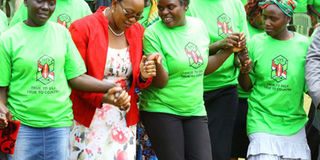Use research to influence youth policies

Public Service, Youth and Gender Affairs Cabinet Secretary Cecily Kariuki joins National Youth Service recruits in a jig at Nyabururu grounds in Kitutu Chache South, Kisii County, on October 10, 2017. Evidence from research can improve the youth policy process. PHOTO | BENSON MOMANYI | NATION MEDIA GROUP
What you need to know:
- Social scientists need to be more forthcoming and share their research findings to benefit government managers.
- Evidence from research can improve the youth policy process, by identifying new issues for the policy agenda.
Jane Lubchenco says that science is more than just fascinating knowledge; it is also useful knowledge that should inform our decisions. We cannot agree more.
Social scientists should take the front seat in learning how to make their science matter, rather than getting buried in the dusty piles of scientific articles that collect in drifts on shelves and forgotten computer files.
There cannot be a better time than now for scientists to restore science to its rightful place.
WELFARE
Social scientists engaged in youth affairs research should rise up and talk to policymakers, provide testimony and answer questions.
There is an increasing recognition that strong and effective youth policies that are evidence-informed are necessary to achieve continued involvement and participation in an efficient and equitable manner.
The incorporation of relevant high-quality research evidence into the youth policy formulation process has been outlined as a key strategy for improving youth livelihoods worldwide.
INTERVENTIONS
Social scientists need to be more forthcoming and share their research findings to benefit government managers, policymakers, and society at large.
They should invoke the full power of the scientific enterprise in discovering new knowledge, in communicating existing and new understanding to the public and policymakers.
This will help policymakers move toward sustainability of youth policy interventions through a better understanding of the consequences of policy actions or inactions.
POLICY
Evidence from research can improve the youth policy process, by identifying new issues for the policy agenda, informing decisions about policy content and direction, and evaluating the impact of policy.
While some authors regard evidence as mostly scientifically-driven facts, others argue that evidence can be formal (such as published research or programme monitoring and evaluation) or informal (such as personal experiences, received wisdom and opinions) depending on its process of generation.
To effectively engage policymakers in the research process, social scientists should be present in relevant networks and sites with a view of soaking up the policy sphere.
This should aim at establishing some authority and ability to communicate with non-academic audiences.
NEW KNOWLEDGE
For social scientists to be able to influence policy change through their research findings, they must ensure that they carry out studies that push the knowledge boundaries.
This can be done by ensuring that their research questions are causal.
This means that the research questions are able to explain the causes and effects of a phenomenon in a systematic way.
Some of the strategies that can be applied is to ensure that they use their critical imagination as they design their studies.
STRATEGY
Think through social phenomenal under investigation in all perspectives and challenge common sense.
This is usually not a walk in the park. However, there are strategies that can be applied.
Social scientists can be innovative in their policy issue investigations and they can approach studies in a multidisciplinary manner.
Social scientists should be deliberate in ensuring that science does not gather knowledge faster than society gathers wisdom.
Dr Kiambati is a management consultant and a senior lecturer at Karatina University. [email protected]. Dr Kariuki is a social scientist, management consultant and a lecturer at Karatina University. [email protected]




